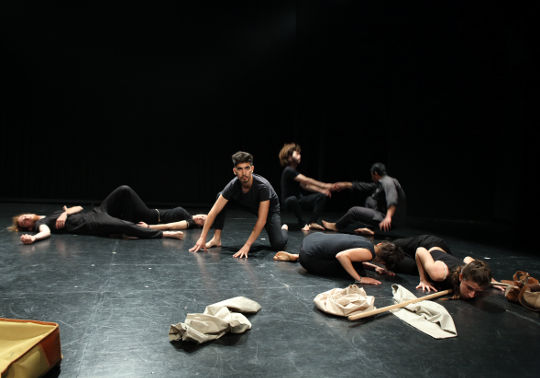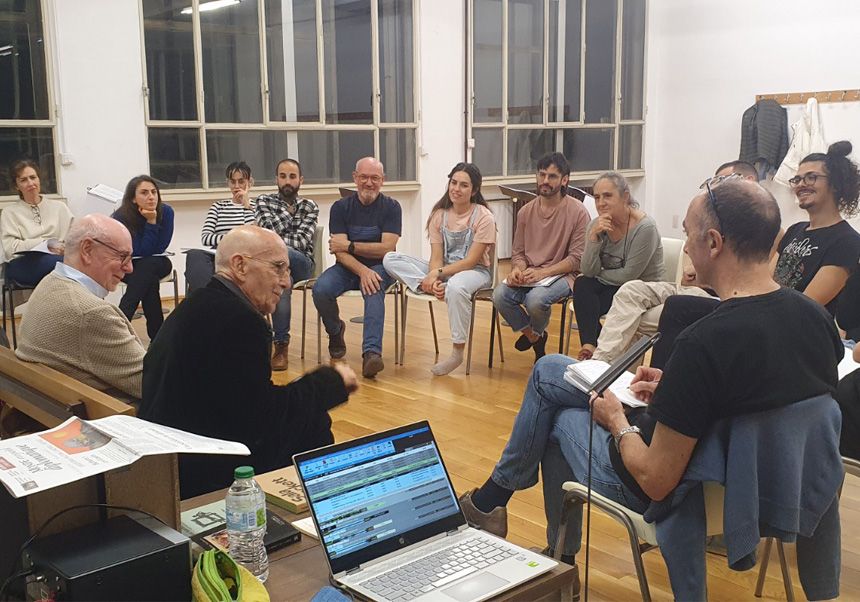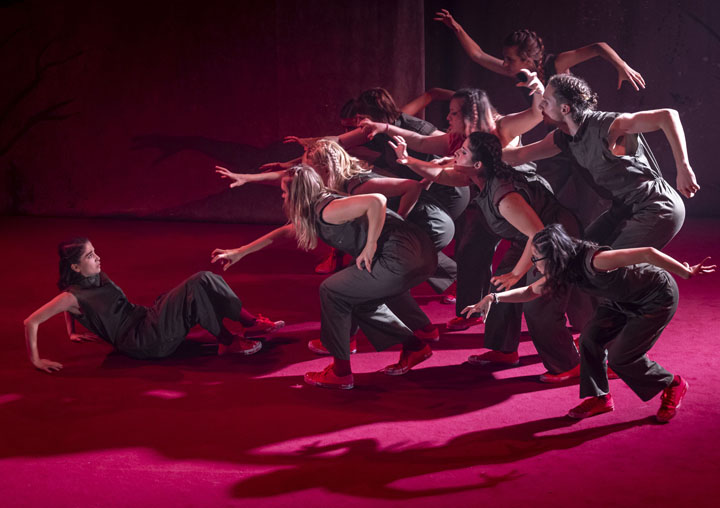“Erasmus Scene European Festival” begins in València, the first European theatre university meeting with students from more than 25 countries
- UV General Foundation
- May 22nd, 2018

The Universitat de València organises on 21 and 25 May the Erasmus Scene European Festival. It is a meeting for European theatre that will bring together in Valencia for the first time all the Erasmus Scene Offices. The Festival, in which will participate students from more than 25 countries, is part of the cultural project Erasmus+ Scene Network (E+SCN). It is a pioneering initiative for the integration of citizen refugees, migrants and Erasmus students through language learning with performing arts as medium of cohesion.
The Cultural Centre La Nau of the Universitat de València will be headquarters of the “Erasmus Scene European Festival”. It has been presented to the media this Monday at the Matilde Salvador Room, where will be performed a theatre play every day during the whole week. Speaker at the press conference have been: vice-principal of Culture and Sport, Antonio Ariño; Josep Valero, of CRIT Companyia de Teatre and technical coordinator of the project; Caterina Barone, coordinator of Scene Erasmus Padova (Italy); Christina Bohle, coordinator of the Erasmus Office of the University of Marburg (Germany); and territorial coordinator of CEAR in the Valencian Community, Jaume Durà.
The vice-principal Antonio Ariño has defined the E+SCN project as “a qualitative leap” of the development of Erasmus Scene, an initiative of the Universitat de València with nearly a decade. His speech was focused on the idea of “theatre and citizenship” and he said: “We build European citizenship through theatre, because this is the reason for the current meeting of students from more than 25 countries. That will create bonds for the whole life”. In addition, he has claimed responsibility in the paper of Europe as continent receiver, welcoming and inclusive of refugees and migrants. “Because they are also Europe and, consequently, they deserve recognition of citizens.” And he added: “We understand the theatre as a connecting element of Europe because the performing arts allow the inclusion in the contribution to represent a collective image, in a sense transnational, of cosmopolitan citizenship”. In this regard, it has appealed to the “dialogue” as tool of “convergence” through the theatre. “It is an opportunity to the development and dignity as individual people and as collective project”.
From CEAR País Valencià, Jaume Durà has referred to the artistic and human part of the project E+SCN: “The theatre as a fundamental tool to criticise the attitude of the governments that do not want a welcoming Europe and close borders”.
And Caterina Barone added: “Our Europe should be a Europe of culture, peace and inclusion, and Erasmus Scene European Festival joins both elements: the cultural and human”.
‘Erasmus Scene European Festival’ is the activity that culminates the project E+SCN, the first network of European university theatre, promoted by the Universitat de València. It will incorporate into its cast refugee people supported by the delegation of CEAR (the Spanish Commission for Refugee Assistance) in Valencian Community.
The Festival includes the premiere of new theatre productions of the groups Erasmus Scene of the universities of València, Padua and Marburg: a trilogy that reflects on the past Europe, present and future with the migration crisis as central topic. In addition to lectures, dramatization workshops, training seasons in European projects, spaces to solidarity and reception in Valencian public institutions, creating a forum for the meeting of new synergies of international and interagency collaboration.
Theatrical performances
The first work of the trilogy is Euripides’ “The Trojan Women”, representing the past of Europe. It is under the direction of Francesco Puccio, of the Scena Erasmus Padova (Italy). He will stage the Greek tragedy on 21 and 22 May. It is one of the best anti-war plays in history. It shows the suffering of women and children after each war fought. It is used to protest against the war and to advise the audience.
The present is in charge of the German theatre Dramarasmus Marburg. They will stage Inga Dreger’s “Re.Un.Ion”. It is a nostalgic trip in our memory searching for the idea of Europe. There will be two stages on 23 and 24 May.
The future will be in charge of the Scene Erasmus Valencia. It will preview “La Gran Final” on 25 May. It is the third part of the trilogy that addresses migrations “Las Pequeñas Europas”. It started a couple of years ago in the province of Valencia with the theatrical play “El Circo de la Frontera” and followed with “La Feria Invisible.
Theatrical performances will start every day at 7:30 p.m. at the Matilde Salvador Room of the historical building of the University. Entrance has a price of 2 euros. You can book them in the early sale in the following link www.latenda.es/entrades or at the Centre Cultural La Nau.
Other activities
The programme of the Festival also has free access activities that will take place at the Main Hall of La Nau at 10:30 a.m. On Tuesday 22, the presentation of the intellectual results of the project E+SCN will take place. On Wednesday 23, there will be a panel of discussion entitled “Culture as a tool for European integration and development”. It will be formed by the Delegate of the Valencian Government for the European Union, Joan Calabuig; the Delegate of the European projects in the provincial government of Valencia, and experts of the Universitat de València. On Thursday 24, it will be the turn of the discussion “Culture, Integration and Mediterranean. Theatre as a tool to integrate refugees” led by the European Mediterranean Institute (IEMED) and CEAR PV.
Following the discussion, the Group of Dolçaines and Percussion of the Universitat de València, directed by Juan Ramon Martí i Chulià, will play at the Cloister of the historical building of La Nau.
Erasmus+ Scene Network
The Universitat de València started the project Erasmus Scene almost a decade ago. Since then, they have worked to invigorate and widen the project to other European cities through their universities. Thus, Erasmus+ Scene Network was established. It is an initiative led by the General Foundation of the Universitat de València and financed by the European programme Erasmus. It integrates four partner institutions of three different countries: the Fundació General and CRIT Companyia de Teatre (Spain), Philipps-Universität Marburg (Germany) and Università degli Studi di Padova (Italy).
It is a European cultural project based in theatre and education. It is intended for Erasmus students, Valencian students and refugees in Valencia. It has been recognised with the European Cultural Heritage Label. The main objective is to establish a meeting point for all those who want to work together in a single task: creating theatrical shows. This process will help participants to improve their linguistic, communicative, artistic and expressive skills, so that they can be more integrated and employable. Hence, it aims to integrate refugees, immigrants and Erasmus students using theatre, dramatic arts and language learning as a vehicle for cohesion.
A festival to enrich the city of Valencia
Erasmus students, professors and university authorities have visited the City Council of Valencia. They were received by the city councillor and deputy mayor, Sandra Gómez. She stated that “it is a privilege for Valencia to host this programme because it will enrich the whole city.”
The Vice-Principal for Culture and Sport, Antonio Ariño, the Vice-Principal of Internationalisation and Cooperation, Carles Padilla; and the manager of the General Foundation of the Universitat de València and leader of the project E+SCN, Cristóbal Suria, were present at the event. Suria thanked the City Council for its support in “a project that will showcase the city of Valencia.”
More information:
File in: Cultura , Arts escèniques , Escena Erasmus , Teatre , Fundació General UV
















